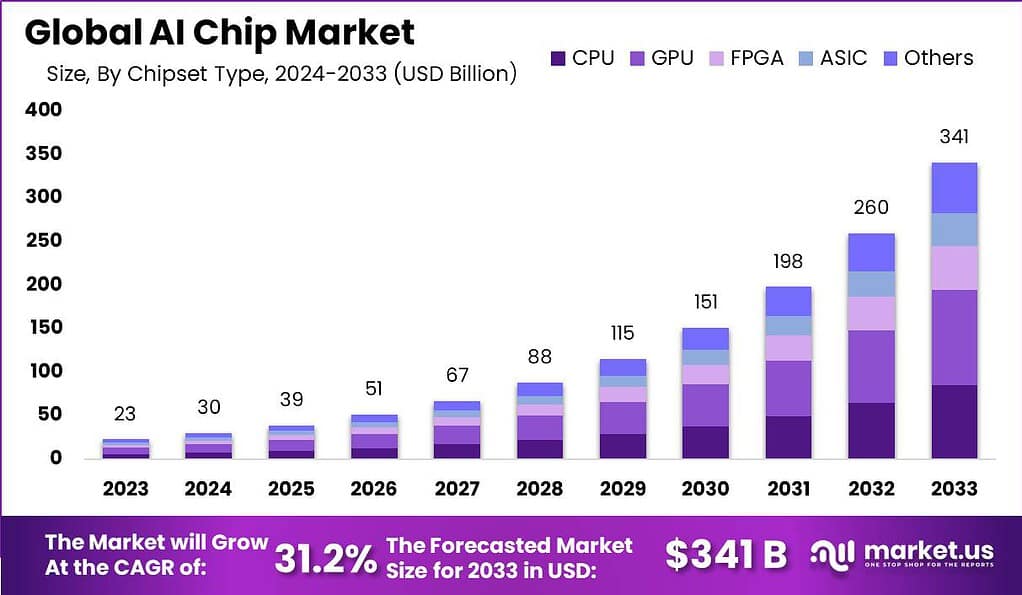Introduction
Based on data from Tech Market Reports, The Global AI Chip Market is projected to experience a substantial growth trajectory. From a valuation of USD 23.0 Billion in 2023, the market size is anticipated to ascend to approximately USD 341 Billion by 2033. This represents a compound annual growth rate (CAGR) of 31.2% over the forecast period spanning from 2024 to 2033. In the current landscape, North America has established a leading position within the AI chip sector, securing a significant portion of the market. In 2023, this region captured over 38% of the global market share, underscoring its pivotal role in the development and deployment of AI chip technologies.
An AI chip, also known as an artificial intelligence chip, is a specialized silicon chip designed to efficiently process AI tasks such as deep learning, machine learning, and neural networks. These chips are engineered to handle massive amounts of data and computations that are integral to AI operations. Unlike standard processors, AI chips are optimized for specific AI tasks, offering greater speed and efficiency which results in accelerated AI computations and reduced energy consumption.
The global market for AI chips is experiencing robust growth driven by the increasing adoption of artificial intelligence technologies across various sectors such as healthcare, automotive, finance, and consumer electronics. Companies are integrating AI chips into a range of products from smartphones and wearable devices to automobiles and industrial robots to enhance functionality and efficiency. The market is further fueled by continuous advancements in semiconductor technologies and the growing demand for high-performance computing in AI applications.
The demand for AI chips is soaring as more industries seek to leverage AI for enhanced data analytics and decision-making capabilities. This trend is particularly strong in sectors like automotive for autonomous driving, healthcare for personalized medicine, and consumer electronics for smarter devices. As AI technologies become more sophisticated and accessible, the demand for AI chips that can deliver real-time processing and learning capabilities continues to climb, indicating a sustained growth trajectory.
Click to learn, How data-driven insights can impact your market position, Request A Sample @ https://techmarketreports.com/report/ai-chip-market/#requestForSample

Source: market.us
The AI chip market is projected to grow significantly in the coming years. Technological innovations and improvements in chip design are making these chips more powerful and cost-effective, which is expected to further propel their adoption. Additionally, the rise of edge computing where data processing occurs on local devices instead of centralized data centers is boosting the need for efficient AI chips that can operate at the edge with minimal latency.
The market for AI chips presents substantial opportunities for both established semiconductor manufacturers and new entrants. There is a growing need for chips that can support the next generation of AI applications, including more complex neural network models and real-time AI processing at the edge. Opportunities also exist in developing AI chips that are more energy-efficient and capable of handling ever-increasing data volumes, catering to the green technology trends and sustainability goals of modern enterprises.
AI Chip Statistics
- The AI Chip market is projected to achieve a significant valuation, estimated at USD 341 billion by 2033, with a Compound Annual Growth Rate (CAGR) of 31.2% over the forecast period.
- The GPU segment maintained a leading position, securing over 32% of the market.
- The System On Chip (SoC) segment similarly showed strong performance, holding more than 36% of the market.
- The Training segment emerged as a major contributor, accounting for over 65% of the market.
- The Edge segment also exhibited substantial dominance with more than 67%.
- The Consumer Electronics segment, while smaller, still held a noteworthy share of over 18%.
- Sales Projections and Market Impact: In 2024, AI chip sales are expected to constitute approximately 11% of the projected global chip market, valued at USD 576 billion. This underscores the increasing integration of AI technologies across various industries.
- Investment Trends: Venture funding for AI chip startups is on an upward trajectory, with investments poised to surpass $20 billion in 2023, up from $15 billion in 2022. The forecast for 2024 indicates a further increase to over $25 billion, reflecting sustained investor confidence.
- NVIDIA’s Market Performance: NVIDIA has solidified its leadership in the AI chip sector, reporting revenues of $13.51 billion in Q2 2023. This represents a year-over-year increase of 101% and an 88% rise from the previous quarter, highlighting robust demand and adoption of NVIDIA’s AI chips across multiple sectors.
Conclusion
The AI chip market is positioned at a critical juncture of technological advancement and widespread application across diverse industries. As the backbone of modern AI technologies, AI chips not only enhance computational efficiencies but also enable real-time analytics and responses in a way traditional processors cannot. With the demand for AI capabilities expanding, growth in the AI chip market is expected to accelerate, presenting ample opportunities for innovation and investment.
This growth is supported by the ongoing advancements in chip technology and the expanding application scope of AI, ensuring that AI chips will remain pivotal in the technological landscape. As businesses and consumers increasingly rely on AI-driven solutions, the AI chip market is set to expand its influence and reach, driving forward the capabilities and possibilities of artificial intelligence.



